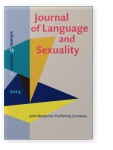Vol. 13:1 (2024) ► pp.51–75
#GaysForTrump
“Coming out” as Republican on Twitter
This article presents a multimodal critical discourse analysis of #GaysForTrump on Twitter as a discursive formation within Trumpism with distinct subject positions connected to specific acts of identification, libidinal investments, and a homonationalist allegiance to the United States, constructed as a homotopia for cisgender, white gay men. Trumpism is a political formation with its own discursive and structural dynamics that we argue have bred a specific strain of homonationalism worth unpacking in its specificity. Our main objective was to understand how identifying as gay was articulated as commensurate with Donald Trump’s particular brand of transgressive and masculinist white nationalism. We identified three overarching discursive strategies: the appropriation of the “coming out” narrative to validate the #GaysForTrump victimization experience; the construction of conservative gay masculinity as desirable; and the articulation of a sexual geopolitics that legitimates the extreme xenophobia of Trumpism.
Article outline
- 1.Introduction
- 2.Gay conservatives: Respectability, homonationalism, and the ‘alt‑right’
- 3.Multimodal critical discourse analysis of #GaysForTrump on Twitter
- 4.Analysis
- 4.1“Coming out” as a gay Trump supporter
- 4.2Desiring the ideal conservative man
- 4.3Sexual (geo)politics
- 5.Discussion and conclusion
- Notes
-
References
For any use beyond this license, please contact the publisher at [email protected].
